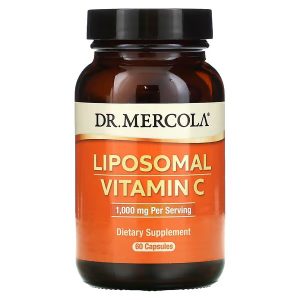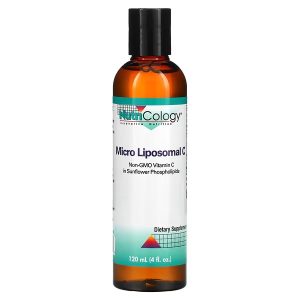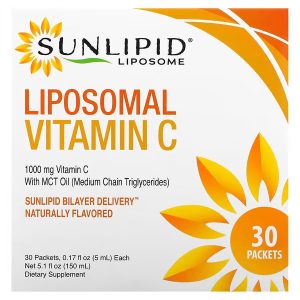Vitamin C Variants: Liposomal and Tablets
Vitamin C, an essential nutrient for maintaining overall health, is available in various forms, each offering unique benefits. In this comprehensive guide, we explore the nuances between liposomal vitamin C and traditional tablets. Understanding these differences is crucial for choosing a supplement that aligns with your health goals and lifestyle. Whether you’re seeking enhanced immune support, better skin health, or general wellness, this comparison will help you make an informed decision about your Vitamin C supplementation.
Understanding Vitamin C and Its Importance
Vitamin C, scientifically known as ascorbic acid, plays a pivotal role in numerous bodily functions. It’s not only crucial for immune system support but also vital for collagen production, wound healing, and the absorption of iron. The human body doesn’t produce Vitamin C naturally, so it must be obtained through diet or supplements. Its antioxidant properties also help combat free radicals, reducing the risk of chronic diseases. This section delves deeper into why Vitamin C is indispensable for your health and the consequences of its deficiency.
Liposomal Vitamin C: The Cutting-Edge Choice
Liposomal vitamin C is a modern form of Vitamin C encapsulation that significantly improves its absorption and bioavailability. This method involves wrapping Vitamin C in a layer of phospholipids, similar to cell membranes, which allows it to bypass the digestive barriers that typically limit absorption. As a result, a higher percentage of Vitamin C reaches the bloodstream and the cells. Ideal for individuals with sensitive stomachs or those requiring high doses, liposomal Vitamin C is becoming increasingly popular due to its efficiency and effectiveness.
Traditional Vitamin C Tablets: The Conventional Go-To
Traditional Vitamin C tablets have been a long-standing choice for many due to their accessibility and affordability. They provide a straightforward method to increase Vitamin C intake, especially for those with a balanced diet looking for an additional supplement. However, the body’s ability to absorb Vitamin C from tablets can be less than optimal. The absorption rate can be affected by various factors, including the individual’s health status and the presence of other nutrients in the digestive tract. Tablets are a reliable option for daily Vitamin C supplementation but may not be the most efficient form for everyone.
Comparing Absorption: Liposomal Vitamin C vs Tablets
The primary difference between liposomal Vitamin C and traditional tablets lies in their absorption rates. Liposomal Vitamin C is designed for enhanced bioavailability, meaning a greater portion of the vitamin is absorbed into the bloodstream and utilized by the body. This is particularly beneficial for those looking to target specific health issues or improve overall well-being rapidly. In contrast, traditional tablets may lose some of their potency during the digestive process, potentially leading to less Vitamin C available for absorption.
Other Forms of Vitamin C Supplements
In addition to liposomal and tablet forms, Vitamin C is available in chewable tablets, powders, and effervescent forms. Chewables are a popular choice for children and those who find swallowing tablets difficult. Powders and effervescent forms can be mixed with liquids for a refreshing alternative, offering flexibility in how they can be consumed. Each of these forms has its specific advantages in terms of taste, convenience, and absorption, making them suitable for different preferences and health requirements.
Choosing the Right Vitamin C Supplement
Selecting the right form of Vitamin C supplement involves several considerations. Absorption efficiency is crucial, especially for those with specific health conditions or higher nutrient needs. Ease of consumption is another factor, as some may prefer a simple tablet over mixing powders. Dietary restrictions and personal health conditions also play a role in determining the most suitable form of Vitamin C. Consulting with a healthcare provider can provide guidance tailored to your individual health situation.
|
Dr. Mercola, Liposomal Vitamin C, 500 mg, 60 Capsules Liposomal Vitamin C works as a powerful antioxidant and nutrient to support immune and organ health by protecting vital elements in your body against harmful free radicals. This formula provides 1000 mg of Vitamin C per serving, effective absorption and meets 100% of the daily value of vitamin C your body needs. |
|
| Nutricology, Micro Liposomal C, 4 fl oz (120 ml)
Non-GMO vitamin C, in pure essential phospholipids from Non-GMO sunflower lecithin. The soy-free liposomes are several times smaller than other vitamin C liposome products. Pours freely as a liquid and tastes great. |
|
| Sunlipid, Liposomal Vitamin C, 30 Packets, 0.17 fl oz (5 ml) Each
An innovative Sunlipid™ Liposomal Vitamin C – with Liposomal Bilayer Delivery System – works by encapsulating Vitamin C in a dual layer of non-GMO sunflower lecithin phosphatidylcholine complex & medium chain triglycerides.
The liposomal encapsulation helps protect the Vitamin C as it passes through the digestive tract, thus allowing for improved absorption in the intestines and at the cellular level. |
Liposomal Vitamin C: Efficacy and Scientific Backing
Scientific research has been increasingly supportive of the enhanced efficacy of liposomal Vitamin C. Studies have demonstrated its superior cellular uptake compared to non-liposomal forms, suggesting a more potent impact on health. This can be particularly relevant for individuals dealing with acute health conditions or those looking to maximize the antioxidant benefits of Vitamin C. While more research is ongoing, current findings are promising regarding the potential of liposomal Vitamin C in both preventive and therapeutic contexts.
Potential Side Effects and Interactions
While Vitamin C is generally safe for most people, high doses, particularly of certain forms like liposomal, can lead to side effects such as digestive discomfort or diarrhea. It’s also essential to be aware of potential interactions with other medications and supplements. Individuals with specific health conditions, like kidney disease, should exercise caution and consult with healthcare professionals before starting high-dose Vitamin C supplements, regardless of the form.
Conclusion: Making an Informed Choice
In conclusion, both liposomal Vitamin C and traditional tablets offer valuable ways to supplement this essential nutrient. Your choice should be influenced by factors like desired absorption rate, ease of use, and specific health needs. While liposomal Vitamin C offers enhanced bioavailability and may be better suited for targeted health objectives, traditional tablets provide a reliable and accessible way to maintain Vitamin C levels. Ultimately, the best choice depends on your individual health goals and preferences.
Additionally, we recommend checking out our recent Vitamin C guide and the powerhouse trio: magnesium calcium and zinc for optimal health!





